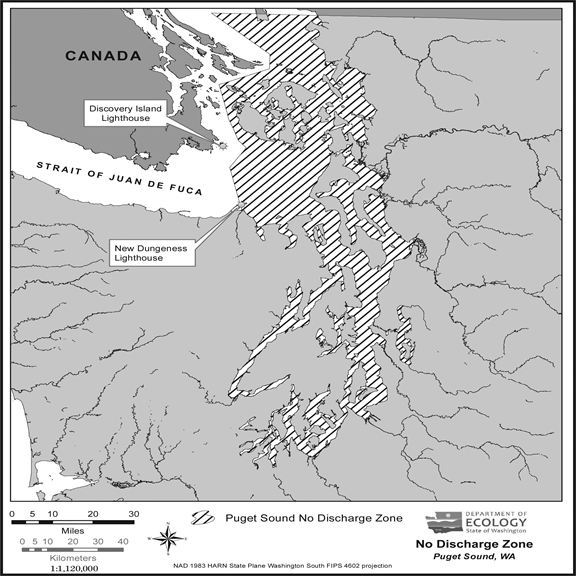Chapter 173-228 WAC
Last Update: 4/9/18VESSEL SEWAGE NO DISCHARGE ZONES
WAC Sections
| HTMLPDF | 173-228-010 | Purpose. |
| HTMLPDF | 173-228-020 | Definitions. |
| HTMLPDF | 173-228-030 | Designated no discharge zones. |
| HTMLPDF | 173-228-040 | Vessel sewage management in no discharge zones. |
| HTMLPDF | 173-228-050 | Effective. |
| HTMLPDF | 173-228-060 | Enforcement. |
PDF173-228-010
Purpose.
The purpose of this chapter is to establish no discharge zones for vessel sewage.
PDF173-228-020
Definitions.
For purposes of this chapter, the following definitions are applicable:
(1) "Commercial fishing vessels" means any vessel which is documented under the laws of the United States or, if under five net tons, registered under the laws of any state, and used for commercial fishing or activities directly related to commercial fishing.
(2) "National Oceanic and Atmospheric Administration (NOAA) research and survey vessels" means NOAA vessels used for research and survey purposes.
(3) "No Discharge Zone" means an area where federal approval has been received to allow a state to completely prohibit the discharge from all vessels of any sewage whether treated or untreated.
(4) "Public vessels" means a vessel owned or bareboat chartered and operated by the United States, by a state or political subdivision thereof, or by a foreign nation, except when such vessel is engaged in commerce.
(5) "Small commercial passenger vessels," also referred to as "small cruise ships" are commercial passenger vessels that provide overnight accommodations for less than two hundred forty-nine overnight passengers for hire, determined with reference to the number of lower berths.
(6) "Sewage," also known as blackwater, means human body wastes and the wastes from toilets and other receptacles intended to receive or retain body wastes.
(7) "Tug boats,""towing vessel" or "tugboat" is a commercial vessel that is engaged in or intending to engage in pulling, pushing, hauling alongside, or a combination thereof.
PDF173-228-030
Designated no discharge zones.
The following are designated no discharge zones where all sewage, whether treated or not, from all vessels is prohibited:
Puget Sound No Discharge Zone: All the marine waters of Washington state inward from the line between New Dungeness Lighthouse (N 48°10'54.454", 123°06'37.004" W) and the Discovery Island Lighthouse (N 48°25'26.456", 123°13'29.554" W) to the Canadian border (intersecting at: N 48°20'05.782", 123°11'58.636" W), and fresh waters of Lake Washington, Lake Union, and connecting waters between and to Puget Sound.
 |
PDF173-228-040
Vessel sewage management in no discharge zones.
Vessel sewage must be managed in no discharge zones.
(1) Vessels with installed and operable toilets must be in compliance with 40 C.F.R. Part 140 with the ability to hold or stop discharges of sewage while in a no discharge zone.
(2) Vessels with marine sanitation devices must secure the devices to prohibit the discharge of sewage per 33 C.F.R. 159.7(b) while in no discharge zone waters.
(3) Vessels without installed toilets must dispose of any collected sewage from portable toilets or other containment devices at facilities in a manner that complies with state law.
PDF173-228-050
Effective.
The Puget Sound No Discharge Zone applies to all vessels on the effective date of this rule except for:
(1) Tug boats, commercial fishing vessels, small commercial passenger vessels, and National Oceanic and Atmospheric Administration (NOAA) research and survey vessels, which have a delayed implementation lasting five years from the effective date for this rule in the Puget Sound No Discharge Zone. The vessels would still be required to comply with existing state and federal discharge regulations in the interim.
(2) Public vessels actively involved in emergency, safety, security, or related contingency operations where it would not be possible to comply with the no discharge zone.
PDF173-228-060
Enforcement.
Ecology may enforce this chapter by using any of the enforcement provisions in chapter 90.48 RCW. In addition, other federal, state and local agencies may provide enforcement, as authorized.